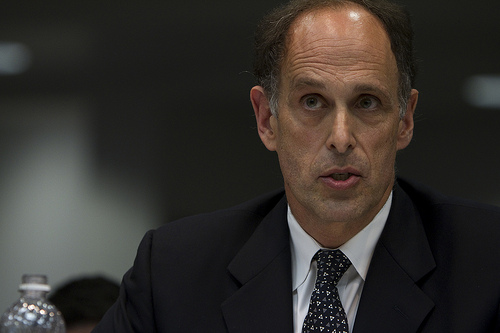On November 22, 2011, Cause of Action wrote to David P. Berry, the Inspector General of the National Labor Relations Board, stating that on the basis of documents received and reviewed by Cause of Action, “we have serious concerns about (i) ex parte communications, (ii) pro-union bias, and (iii) a fundamental lack of internal accountability and oversight at the National Labor Relations Board.”
Cause of Action alleged that former Member and Chairman Wilma Liebman and Acting General Counsel Lafe Solomon engaged in improper Ex Parte Communications. According to Cause of Action, “[n]ormally, these communications would not be problematic under the law; but where evidence has shown Lafe Solomon to have discussed the Boeing matter with Chair Wilma Liebman, the above communications may reflect a knowing intent to influence the Board’s decision-making. Indeed, these e-mails reflect post-Boeing lawsuit communications between Public Affairs Director Nancy Cleeland and Richard Ahearn, between Nancy Cleeland and Lafe Solomon and Chair Wilma Liebman, between Richard Ahearn and Lafe Solomon, Nancy Cleeland, and Barry Kearney, from New Media specialist Anthony Wagner to Wilma Liebman, Lafe Solomon, and Nancy Cleeland regarding Boeing, from Nancy Cleeland to Richard Ahearn and Barry Kearney and from Adam Naill of the Senate Health, Education, Labor and Pensions (HELP) Committee to Jose Garza of NLRB Public Affairs, who forwarded Senator Henry Reid’s statements in support of the NLRB’s decision to sue Boeing to Lafe Solomon and Wilma Liebman[.]”
Under the Administrative Procedure Act (“APA”), a member of the NLRB must not make a prohibited communication with interested persons outside the agency. The American Bar Association’s Model Code of Judicial Conduct bars ex parte communications except those limited to “consultation with court personnel . . . or with other judges.” The NLRB’s own ex parte rules prohibit communications with outside, interested persons. The rules define an ex parte communication as “an oral or written communication not on the public record with respect to which reasonable prior notice to all parties is not 2given[.]” Prohibited communications include written communications “if copies thereof are not contemporaneously served by the communicator on all parties to the proceeding” as well as oral communications “unless advance notice thereof is given by the communicator to all parties in the proceeding and adequate opportunity afforded to them to be present.” According to the NLRB rules, “[n]o interested person outside this agency shall … make or knowingly cause to be made any prohibited ex parte communication to Board agents .. . relevant to the merits of the proceeding.” Moreover, no agent of the Board shall request any prohibited ex parte communications or “make or knowingly cause to be made” any prohibited ex parte communications about the proceeding to any interested person outside the agency relevant to the merits of the proceeding.”
The NLRB rules define “person outside this agency” to include “any individual outside this agency, partnership, corporation, association, or other entity, or an agent thereof, and the general counsel or his representative when prosecuting an unfair labor practice proceeding before the Board pursuant to section 10(b) of the Act.” Under the rules, an on-the-record proceeding subject to ex parte communications would include “an unfair labor practice proceeding pursuant to section 1O(b) of the Act, communications to … members of the Board and their legal assistants, from the time the complaint and/or notice of hearing is issued, or the time the communicator has knowledge that a complaint or notice of hearing will be issued, whichever occurs first.” Thus, any communication by Acting General Counsel Lafe Solomon to then-NLRB Chair Wilma Liebman relevant to the Boeing case would appear to violate the statute. Likewise, communications by Board Chair Wilma Liebman to Lafe Solomon and third-parties would similarly constitute statutory violations.
Moreover, it would appear that the conduct of the NLRB does not meet any of the exceptions, whether under the APA, the ABA Rules of Judicial Conduct, or even the NLRB’s own rules.
Cause of Action’s attorneys argued, “[i]t would also appear that the NLRB exercises bias in the way it processes labor complaints against employers under Section 8 of the National Labor Relations Act (“NLRA”).”
As early as April 2, 2010, over a year before the NLRB used its Office of General Counsel to sue Boeing, Richard Ahearn communicated with and had meetings with David Campbell and other lawyers and staff of the International Association of Machinists (“IAM”) concerning the lAM’s lawsuit against Boeing[.]
Cause of Action asked the NLRB OIG to “investigate to what extent impermissible ex parte communications occurred between former NLRB board member Wilma Liebman and NLRB General Counsel Lafe Solomon regarding the complaint filed
against Boeing.”
- See CoA’s full Request for Investigation to the NLRB OIG
- See the Washington Examiner report on Cause of Action’s findings.
- A response letter dated April 9, 2012 from Lafe Solomon and the NLRB.

